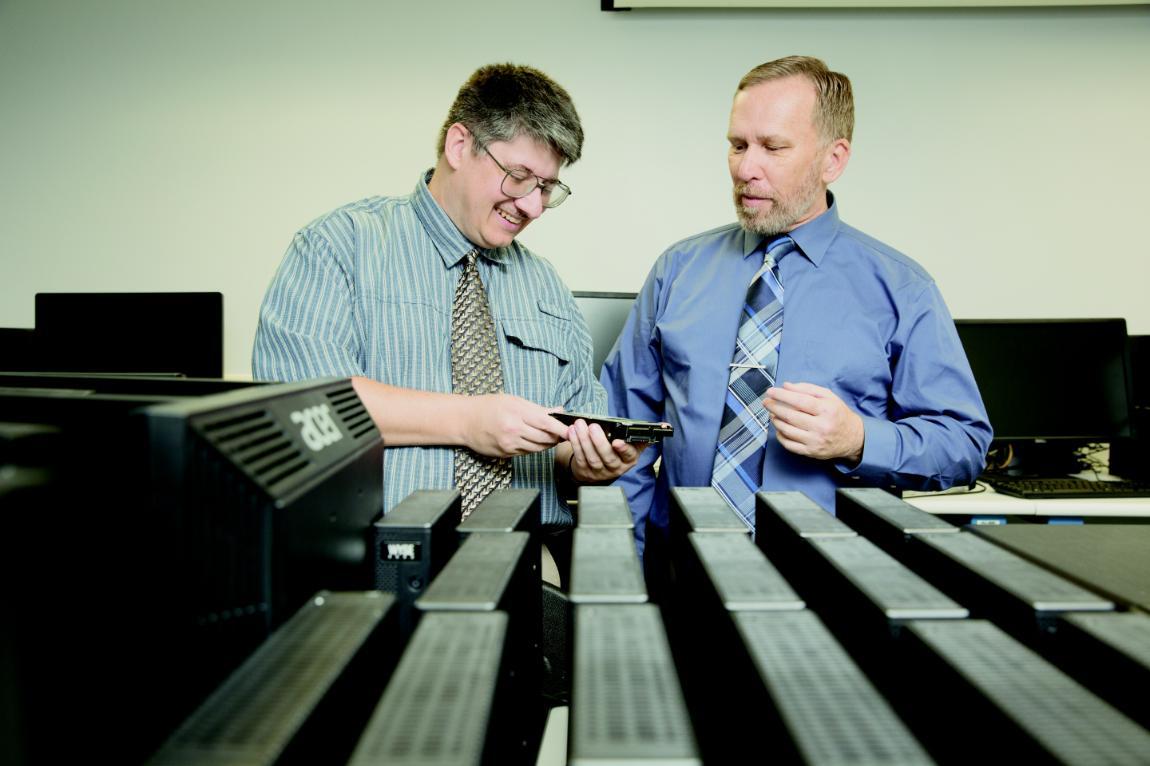Dr. Robert Marmorstein (left) and Dr. Darrell Carpenter believe students with skills in both cyber security and computer science will be highly sought-after by employers.
When Dr. Darrell Carpenter and Dr. Robert Marmorstein sat down to assess the ways the cyber security and computer science programs at Longwood could collaborate more, they decided they needed to do some rewiring—literally.
The two programs naturally complement each other—and each is in a field where there is an intense need for highly skilled graduates to meet growing job demand. Recognizing this, the duo set out to find ways to prioritize marketability for graduates.
“We want them to go out with the best skills they can have and compete in the rapidly growing cyber job market,” said Carpenter, director of the Center for Cyber Security. We both feel the best thing for our students is to have a combination of a major and a minor that positions them well.”
The first change: opening up and marketing the cyber security, forensics and policy concentration to computer science majors who hadn’t considered the career implications of having both sets of important skills.
“The demand is so high right now, you don’t have to have the cyber security credential to get the job, but it really helps,” said Marmorstein, associate professor of computer science.
Cyber security education is a top priority in Virginia, and the demand for highly skilled workers in related fields greatly exceeds the supply in the commonwealth. Former Gov. Terry McAuliffe regularly noted during his term that the state has an estimated 36,000 cyber jobs open and the starting annual salary is $88,000.
Dr. David Shoenthal, former chair of the mathematics and computer science department, and current associate provost for accreditation and compliance, and Dr. Bennie Waller, chair of accounting, economics, finance, real estate and information systems and cyber security, were also instrumental in the push for increased coordination.
'We want [students] to go out with the best skills they can have.'
DR. DARRELL CARPENTER
The initiative, which began last year, is yielding noteworthy results. Carpenter said he has noticed a significant uptick in computer science majors declaring a minor in cyber security. Some revisions were also made in the computer science program, part of the Cook-Cole College of Arts and Sciences, so that it is a more appealing minor for students studying cyber security.
“It gives them mathematical and algorithm skills that they wouldn’t have with just the pure business degree,” Marmorstein noted. When they get hired, it enables them to be promoted more quickly.”
Making the seemingly natural collaboration work required a cultural shift on the part of both programs.
“I always tell people Longwood is unique because at most places computer science people think that business is where you go if you can’t do computer science, and business people think that computer science is nothing but stuffed shirts,” Marmorstein said. “It really is pretty remarkable that we are breaking down those stereotypes and finding ways we can collaborate so that it benefits both programs.”



Leave a Comment